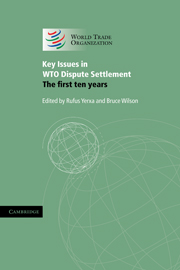Book contents
- Frontmatter
- Contents
- Notes on contributors
- Preface
- Table of cases
- Abbreviations
- PART I Introduction and General Considerations
- PART II The WTO Dispute Settlement System: Its Processes and Its Institutions
- PART III The WTO Dispute Settlement System: Systemic and Other Issues
- 12 The role of lawyers in the WTO dispute settlement system
- 13 Jurisdiction in WTO dispute settlement
- 14 Due process in WTO disputes
- 15 Standards of review in WTO panel proceedings
- 16 Administration of evidence in WTO dispute settlement proceedings
- 17 Confidentiality issues under the DSU: fact-finding process versus confidentiality
- 18 Panels' consultations with scientific experts
- 19 Amicus curiae participation in WTO dispute settlement: reflections on the past decade
- 20 Suspension of concessions and retaliation under the Agreement on Safeguards: the recent US – Steel Safeguards case
- 21 Compliance with WTO dispute settlement decisions: is there a crisis?
- 22 DSU review: a view from the inside
- PART IV Annexes
12 - The role of lawyers in the WTO dispute settlement system
from PART III - The WTO Dispute Settlement System: Systemic and Other Issues
Published online by Cambridge University Press: 04 August 2010
- Frontmatter
- Contents
- Notes on contributors
- Preface
- Table of cases
- Abbreviations
- PART I Introduction and General Considerations
- PART II The WTO Dispute Settlement System: Its Processes and Its Institutions
- PART III The WTO Dispute Settlement System: Systemic and Other Issues
- 12 The role of lawyers in the WTO dispute settlement system
- 13 Jurisdiction in WTO dispute settlement
- 14 Due process in WTO disputes
- 15 Standards of review in WTO panel proceedings
- 16 Administration of evidence in WTO dispute settlement proceedings
- 17 Confidentiality issues under the DSU: fact-finding process versus confidentiality
- 18 Panels' consultations with scientific experts
- 19 Amicus curiae participation in WTO dispute settlement: reflections on the past decade
- 20 Suspension of concessions and retaliation under the Agreement on Safeguards: the recent US – Steel Safeguards case
- 21 Compliance with WTO dispute settlement decisions: is there a crisis?
- 22 DSU review: a view from the inside
- PART IV Annexes
Summary
Lawyers as advocates: from international tribunals to the WTO dispute settlements organs
Before entering the subject matter a terminological specification is necessary. By ‘lawyers’ one can refer both to advocates and more generally to ‘jurists’. In this chapter I will refer to lawyers as advocates in their capacity as representatives of parties in proceedings before the WTO dispute settlement organs (the panels and the Appellate Body). I will also focus on their role as legal advisers to interested private parties; these are first of all enterprises de facto involved and directly affected by the outcome of these proceedings. Other private parties have also to be considered, such as Non-Governmental Organizations (NGOs) when they have an interest of a general nature in the result of a given case in the light of the interest they pursue.
The role of advocates in international litigation is well known. If we take as a classical example proceedings before the International Court of Justice, the distinction between ‘agents’ of a government and lawyers that argue, both orally and in writing on their behalf, is recognized in the relevant rules. Most governments are not equipped with the legal expertise necessary to submit and carry on a case before an international court, be it as claimants or respondents or third parties. Lawyers have stepped in in their specific capacity. Experts in public international law, mostly academics, have been relied upon and some well-known experts in this field have established a reputation for appearing on behalf of governments.
- Type
- Chapter
- Information
- Key Issues in WTO Dispute SettlementThe First Ten Years, pp. 125 - 131Publisher: Cambridge University PressPrint publication year: 2005
- 2
- Cited by



